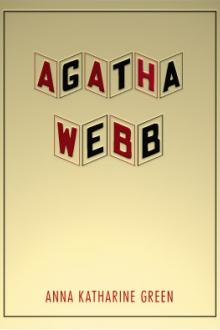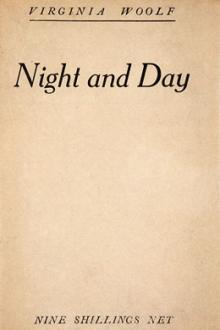Agatha Webb by Anna Katharine Green (top rated books of all time .txt) 📕

- Author: Anna Katharine Green
- Performer: -
Book online «Agatha Webb by Anna Katharine Green (top rated books of all time .txt) 📕». Author Anna Katharine Green
“A mysterious young woman,” muttered the minister.
“And one that I neither countenance nor understand,” interpolated Mr. Sutherland. “I have just shown my displeasure at her actions by dismissing her from my house.”
The coroner gave him a quick look, seemed about to speak, but changed his mind and turned toward the dead woman.
“We have a sad duty before us,” said he.
The investigations which followed elicited one or two new facts. First, that all the doors of the house were found unlocked; and, secondly, that the constable had been among the first to enter, so that he could vouch that no disarrangement had been made in the rooms, with the exception of Batsy’s removal to the bed.
Then, his attention being drawn to the dead woman, he discovered the key in her tightly closed hand.
“Where does this key belong?” he asked.
They showed him the drawers in the cupboard.
“One is empty,” remarked Mi. Sutherland. “If the other is found to be in the same condition, then her money has been taken. That key she holds should open both these drawers.”
“Then let it be made use of at once. It is important that we should know whether theft has been committed here as well as murder.” And drawing the key out, he handed it to Mr. Fenton.
The constable immediately unlocked the drawer and brought it and its contents to the table.
“No money here,” said he.
“But papers as good as money,” announced the doctor. “See! here are deeds and more than one valuable bond. I judge she was a richer woman than any of us knew.”
Mr. Sutherland, meantime, was looking with an air of disappointment into the now empty drawer.
“Just as I feared,” said he. “She has been robbed of her ready money. It was doubtless in the other drawer.”
“How came she by the key, then?”
“That is one of the mysteries of the affair; this murder is by no means a simple one. I begin to think we shall find it full of mysteries.”
“Batsy’s death, for instance?”
“O yes, Batsy! I forgot that she was found dead too.”
“Without a wound, doctor.”
“She had heart disease. I doctored her for it. The fright has killed her.”
“The look of her face confirms that.”
“Let me see! So it does; but we must have an autopsy to prove it.”
“I would like to explain before any further measures are taken, how I came to know that Agatha Webb had money in her house,” said Mr. Sutherland, as they stepped back into the other room. “Two days ago, as I was sitting with my family at table, old gossip Judy came in. Had Mrs. Sutherland been living, this old crone would not have presumed to intrude upon us at mealtime, but as we have no one now to uphold our dignity, this woman rushed into our presence panting with news, and told us all in one breath how she had just come from Mrs. Webb; that Mrs. Webb had money; that she had seen it, she herself; that, going into the house as usual without knocking, she had heard Agatha stepping overhead and had gone up; and finding the door of the sitting-room ajar, had looked in, and seen Agatha crossing the room with her hands full of bills; that these bills were big bills, for she heard Agatha cry, as she locked them up in the cupboard behind the book-shelves, ‘A thousand dollars! That is too much money to have in one’s house’; that she, Judy, thought so too, and being frightened at what she had seen, had crept away as silently as she had entered and run away to tell the neighbours. Happily, I was the first she found up that morning, but I have no doubt that, in spite of my express injunctions, she has since related the news to half the people in town.”
“Was the young woman down yonder present when Judy told this story?” asked the coroner, pointing towards the yard.
Mr. Sutherland pondered. “Possibly; I do not remember. Frederick was seated at the table with me, and my housekeeper was pouring out the coffee, but it was early for Miss Page. She has been putting on great airs of late.”
“Can it be possible he is trying to blind himself to the fact that his son Frederick wishes to marry this girl?” muttered the clergyman into the constable’s ear.
The constable shook his head. Mr. Sutherland was one of those debonair men, whose very mildness makes them impenetrable.
V A SPOT ON THE LAWNThe coroner, on leaving the house, was followed by Mr. Sutherland. As the fine figures of the two men appeared on the doorstep, a faint cheer was heard from the two or three favoured persons who were allowed to look through the gate. But to this token of welcome neither gentleman responded by so much as a look, all their attention being engrossed by the sight of the solitary figure of Miss Page, who still held her stand upon the lawn. Motionless as a statue, but with her eyes fixed upon their faces, she awaited their approach. When they were near her she thrust one hand from under her cloak, and pointing to the grass at her feet, said quietly:
“See this?”
They hastened towards her and bent down to examine the spot she indicated.
“What do you find there?” cried Mr. Sutherland, whose eyesight was not good.
“Blood,” responded the coroner, plucking up a blade of grass and surveying it closely.
“Blood,” echoed Miss Page, with so suggestive a glance that Mr. Sutherland stared at her in amazement, not understanding his own emotion.
“How were you able to discern a stain so nearly imperceptible?” asked the coroner.
“Imperceptible? It is the only thing I see in the whole yard,” she retorted, and with a slight bow, which was not without its element of mockery, she turned toward the gate.
“A most unaccountable girl,” commented the doctor. “But she is right about these stains. Abel,” he called to the man at the gate, “bring a box or barrel here and cover up this spot. I don’t want it disturbed by trampling feet.”
Abel started to obey, just as the young girl laid her hand on the gate to open it.
“Won’t you help me?” she asked. “The crowd is so great they won’t let me through.”
“Won’t they?” The words came from without. “Just slip out as I slip in, and you’ll find a place made for you.”
Not recognising the voice, she hesitated for a moment, but seeing the gate swaying, she pushed against it just as a young man stepped through the gap. Necessarily they came face to face.
“Ah, it’s you,” he muttered, giving her a sharp glance.
“I do not know you,” she haughtily declared, and slipped by him with such dexterity she was out of the gate before he could respond.
But he only snapped his finger and thumb mockingly at her, and smiled knowingly at Abel, who had lingered to watch the end of this encounter.
“Supple as a willow twig, eh?” he laughed. “Well, I have made whistles out of willows before now, and hallo! where did you get that?”
He was pointing to a rare flower that hung limp and faded from Abel’s buttonhole.
“This? Oh, I found it in the house yonder. It was lying on the floor of the inner room, almost under Batsy’s skirts. Curious sort of flower. I wonder where she got it?”
The intruder betrayed at once an unaccountable emotion. There was a strange glitter in his light green eyes that made Abel shift rather uneasily on his feet. “Was that before this pretty minx you have just let out came in here with Mr. Sutherland?”
“O yes; before anyone had started for the hill at all. Why, what has this young lady got to do with a flower dropped by Batsy?”
“She? Nothing. Only—and I have never given you bad advice, Abel— don’t let that thing hang any longer from your buttonhole. Put it into an envelope and keep it, and if you don’t hear from me again in regard to it, write me out a fool and forget we were ever chums when little shavers.”
The man called Abel smiled, took out the flower, and went to cover up the grass as Dr. Talbot had requested. The stranger took his place at the gate, toward which the coroner and Mr. Sutherland were now advancing, with an air that showed his great anxiety to speak with them. He was the musician whom we saw secretly entering the last-mentioned gentleman’s house after the departure of the servants.
As the coroner paused before him he spoke. “Dr. Talbot,” said he, dropping his eyes, which were apt to betray his thoughts too plainly, “you have often promised that you would give me a job if any matter came up where any nice detective work was wanted. Don’t you think the time has come to remember me?”
“You, Sweetwater? I’m afraid the affair is too deep for an inexperienced man’s first effort. I shall have to send to Boston for an expert. Another time, Sweetwater, when the complications are less serious.”
The young fellow, with a face white as milk, was turning away.
“But you’ll let me stay around here?” he pleaded, pausing and giving the other an imploring look.
“O yes,” answered the good-natured coroner. “Fenton will have work enough for you and half a dozen others. Go and tell him I sent you.”
“Thank you,” returned the other, his face suddenly losing its aspect of acute disappointment. “Now I shall see where that flower fell,” he murmured.
VI“BREAKFAST IS SERVED, GENTLEMEN!”
Mr. Sutherland returned home. As he entered the broad hall he met his son, Frederick. There was a look on the young man’s face such as he had not seen there in years.
“Father,” faltered the youth, “may I have a few words with you?”
The father nodded kindly, though it is likely he would have much preferred his breakfast; and the young man led him into a little sitting-room littered with the faded garlands and other tokens of the preceding night’s festivities.
“I have an apology to make,” Frederick began, “or rather, I have your forgiveness to ask. For years” he went on, stumbling over his words, though he gave no evidence of a wish to restrain them—“for years I have gone contrariwise to your wishes and caused my mother’s heart to ache and you to wish I had never been born to be a curse to you and her.”
He had emphasised the word mother, and spoke altogether with force and deep intensity. Mr. Sutherland stood petrified; he had long ago given up this lad as lost.
“I—I wish to change. I wish to be as great a pride to you as I have been a shame and a dishonour. I may not succeed at once; but I am in earnest, and if you will give me your hand—”
The old man’s arms were round the young man’s shoulders at once.
“Frederick!” he cried, “my Frederick!”
“Do not make me too much ashamed,” murmured the youth, very pale and strangely discomposed. “With no excuse for my past, I suffer intolerable apprehension





Comments (0)